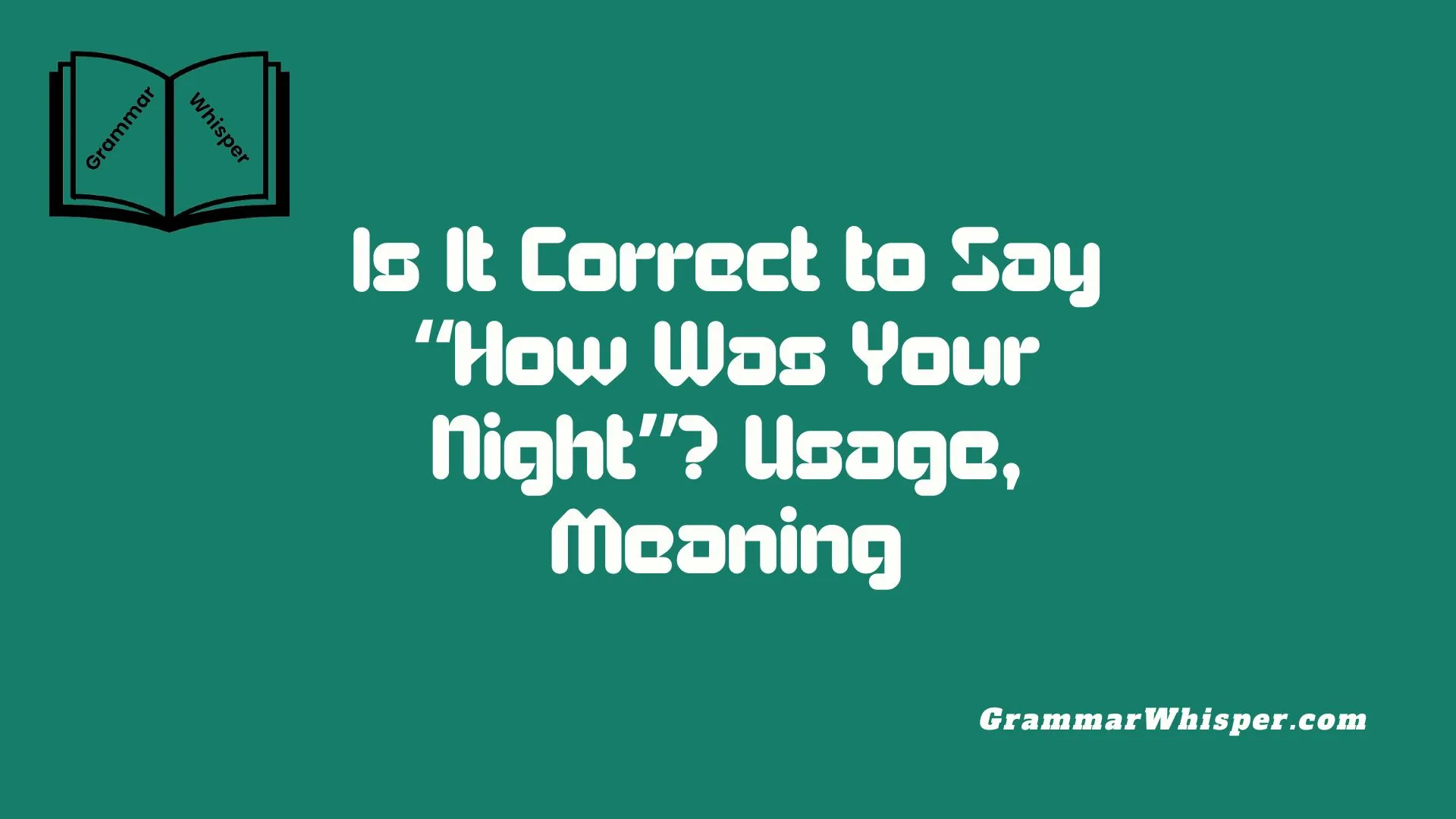I remember I once asked my roommate, “How was your night?” just as he walked into the kitchen looking groggy. I immediately wondered if I had been too forward. These kinds of everyday questions might seem harmless or even caring, but they can be unexpectedly loaded. Depending on your tone, such a phrase might feel oddly personal, maybe even invasive. It’s got a kind of subtle meaning, shaped by the context – your relationship with the person, whether it’s a coworker, a loved one, or just an acquaintance. And even the way it’s used, like with a peppy voice or a flat delivery, makes a difference. One can sound warm, the other, frankly, a bit suspicious or nosy.
Looking at it from a grammar standpoint, the sentence is completely correct. Still, what really matters is how you say it and how the listener hears it. In some cultures, this kind of communication might feel too familiar, while others treat it as polite small talk. If you’re unsure, you can always rephrase – especially in professional settings – to something more respectful, like “Did you sleep well?” or “Hope you had a restful night.” These are more clear in intent. Personally, I’ve learned that it’s smart to stick with what feels naturally conversational but also socially aware. Over time, you develop a kind of practical wisdom – a sensitivity to nuance that helps you navigate better, more smooth, and mindful interactions.
Understanding the Grammar and Structure of “How Was Your Night?”
Is it grammatically correct? The sentence uses a past-tense verb (“was”) and the possessive pronoun (“your”) correctly. It mirrors questions like “How was your day?” or “How was your weekend?” which are considered appropriate in casual or semi-formal English.
Formality scale:
- ✔️ Casual use: between friends or roommates
- ✅ Neutral for colleagues: friendly greeting at morning standups
- ⚠️ Cautious in formal/professional settings: it might feel informal or personal
Alternate phrasing for clarity or tone:
- “Did you sleep well?” (concern-focused)
- “How did your evening go?” (more neutral)
What “How Was Your Night?” Really Means
Literal vs. implied meaning Literally, you’re asking about someone’s night. Figuratively, tone and context shift the intent – whether you’re caring about rest, checking in on an event, or hinting at casual post-date interest.
Subtext matters
- Late-night texts between dates? It hints at romantic interest.
- Checking in the morning after a business trip? It’s professional courtesy.
The Power of Context: Situations That Shape Meaning
Romantic vs. Platonic
- Morning after a date → caring, somewhat intimate
- Among friends → simple small talk
- With acquaintances → potentially intrusive
Time of day matters
- Ask at 7AM? It signals true curiosity or empathy
- Ask at 11AM? It might come off as awkward or delayed
Environmental signals
- Tired voice? Signs of chaos? Your tone and look shape how the recipient interprets the question.
Cultural Sensitivity and Regional Norms
Across English-speaking regions this phrase lands differently:
| Region | Commonality | Perception |
| USA | Very common | Generally accepted in workplace |
| UK | Less common | Can sound too personal in office |
| Australia | Casual usage | Mostly fine socially |
| South Africa | Moderate use | Context-dependent |
In more reserved cultures, nightlife might feel private – and asking about it could feel intrusive or out of place.
Social Boundaries and Emotional Triggers
Why it might feel invasive
- Asking after trauma or surgery
- When sleep is a luxury topic
- Recent conflict, insomnia, or grief
Influencing factors:
- Voice tone (gentle vs. sharp)
- History and closeness between speakers
Politeness in Language: Better Alternatives to Consider
If you want to check in without prying, try these:
- “Did you sleep well?” → comfort-based
- “Hope your night was restful” → gentle
- “Did your meeting go okay?” → specific to events
Choose phrasing that signals genuine concern – not social probing.
How to Respond to “How Was Your Night?” Naturally
Respond differently based on the asker:
- Partner or close friend → open up: “Honestly? It was tough. I barely slept.”
- Coworker or boss → brief but honest: “It was okay, thanks. Looking forward to today.”
- Acquaintance or stranger → light and neutral: “Pretty good, you?”
Use humor or redirect: “Night? About as restful as a toddler’s birthday party!” “Short answer: I survived… How about your evening?”
Nonverbal Cues: Reading and Using Body Language
Subtle can speak loud:
- Tone matters – a soft “how was your night?” shows care
- Eye contact signals interest
- Posture (leans vs. crossed arms) adds or reduces warmth
Match your body language to the moment and relationship.
The Phrase Across Different English-Speaking Cultures
- American workplaces embrace it casually
- British settings might find it too “up-close”
- Australian greetings use it among friends
- Global vs local nuance: In some African or Asian settings, nighttime conversations remain private
Case Studies: Real Conversations, Real Reactions
Case study 1 – Romantic evening Colleague Sarah texts Dave at 8AM:
“Hey Dave, How was your night?” Response: “It was great, thanks – for a change. How did yours go?” Tone: Light, implies mutual interest.
Case study 2 – Sleep-deprived night Boss to employee:
“Hey, how was your night?” Response: “Need more coffee than sleep, but thanks for asking.” Outcome: bonding moment, informality works.
Case study 3 – Invasive vs neutral New acquaintance asks at 11AM:
“So, how was your night?” Response: “Fine, thanks. Let’s get that coffee.” Redirecting gracefully to neutral ground.
Conclusion
Yes, “How was your night?” is grammatically correct and can be polite. But its impact hinges on tone, context, and culture. Use it thoughtfully and know when softer alternatives serve better. Knowing when – and to whom – to ask can strengthen connections, not awkward conversations.
Quick Reference Table – When to Say It and When Not To
| Situation | Use “How was your night?”? | Better Alternative |
| Cozy chat with partner/friend | ✅ Yes | N/A |
| Early-morning office greeting | ⚠️ Optional | “Good morning! How did you sleep?” |
| First catch-up with acquaintance | ❌ No | “Morning! Did you rest well?” |
| After a late-night date/event | ✅ Yes | “That was fun – how was your night?” |
FAQs
Is it grammatically correct to say “How was your night?”
Yes, the phrase is grammatically correct. It follows the standard English structure for past-tense questions using “was” as the past tense of “is.” It’s similar in form to “How was your day?” or “How was your weekend?”
When should I avoid asking “How was your night?”
Avoid it when you’re speaking to someone you don’t know well, in professional settings where boundaries are important, or when the person might have gone through a stressful or traumatic event. In these cases, it could feel too personal or insensitive.
What’s a polite alternative to “How was your night?”
Try:
- “Did you sleep well?”
- “Hope you had a restful evening.”
- “How are you feeling this morning?” These options are less intrusive and still show care or interest.
Is “How was your night?” used differently around the world?
Yes. In the U.S., it’s a casual greeting. In the U.K., it can feel a bit too familiar. In Australia, it’s acceptable among friends. In more conservative cultures, the phrase might be avoided due to its personal nature.
How should I respond if someone asks me “How was your night?”
Keep it light if you’re not close: “It was okay, thanks.” Be honest but respectful if you’re comfortable: “Rough night, didn’t get much sleep.” Or use humor if it fits: “Like a Netflix binge with extra yawns.” Match your tone to the situation and your relationship with the speaker.











